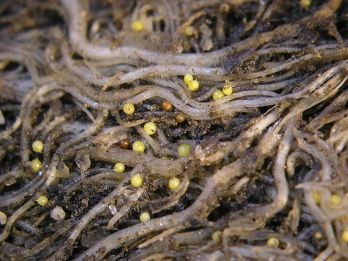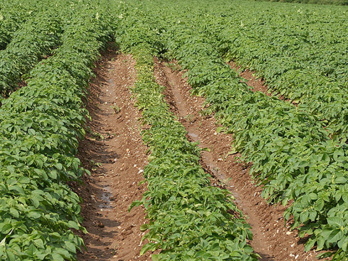Potato cyst nematodes
Potato cyst nematodes (PCN) are microscopic round worms declared as a notifiable pest under the South Australian Plant Health Act 2009.
Background
There are 2 types of potato cyst nematode of concern in the Globodera species:
- white or pale PCN (Globodera pallida) is an exotic plant pest not present in Australia
- yellow or golden PCN (Globodera rostochiensis) is present in some areas of Victoria.
Interstate quarantine controls were in place, based on the treatment and certification of all vectors produced or sourced from within 20km of a known PCN detection. These have been replaced by property-based controls, related to potatoes, nursery stock, root vegetables, soil, used machinery, and equipment.
Quarantine controls
When a PCN infestation is found, regulatory controls are imposed on potato growers and all businesses that involve moving soil. The following definitions apply to affected land.
Infested land
Hosts produced or sourced from PCN infested land is prohibited entry into South Australia.
This includes any defined paddock, or area, which has had a positive PCN in accordance with national sampling and testing regimes.
Linked land
Linked growers can continue marketing their crops to most markets under pre-existing accreditation arrangements.
This relates to any land which:
- has been farmed with equipment used on known PCN infested land
- borders PCN infested land
- receives direct drainage from PCN infested land
- is currently, or has previously been planted with seed sourced from either:
- PCN infested land
- land exposed to PCN as a result of a regulatory violation.
Un-infested land
South Australia issues an Area Freedom Certificate for PCN to facilitate trade.
This relates to any land which:
- is not classified as a linked land
- has no known PCN infestation.
All seed potatoes sold for planting will require mandatory PCN soil testing and industry adherence to a PCN Farm Hygiene Code of Practice.
Learn more in condition 18 of the Plant Quarantine Standard (PQS).
Impacts
PCN are a pest for potato, tomato, aubergine, and other plants from the family of the Solanaceae (nightshade plants). The nematodes live and feed on the roots of hosts, causing significant damage to their root systems. This occurs below the ground before symptoms are visible above ground.
PCN can result in complete crop failure to potatoes if not controlled. It has the potential to devastate the Australian potato industry through the loss of export markets.
The soil-borne pest is spread by wind, rain, water, and transport of infected soil or materials. Examples include seed potatoes, potted nursery stock and packaging, flower bulbs, unwashed root crops for consumption or processing, footwear, livestock, farming equipment and waste from potato grading operations.
Identification
PCN damage may appear similar to water or nutrient deficiencies, or wilt diseases. Plant growth is stunted, and:
- leaves yellow early or turn a dull colour
- flowering is delayed
- plants may wilt.
Infested potato plants have a reduced root system which is abnormally branched and brownish in colour. At or after flowering, tiny white, yellow, or brown cysts about 5mm wide might be seen on the outside of roots.
Lifecycle
The nematodes are less than 1mm in size. Eggs develop in the bodies of mated females, which protrude from the surface of the potato roots or tubers. The female forms the resistant cyst when she dies, containing 200 to 600 eggs.
Cysts may detach and lodge in the soil. PCN juveniles hatch from cysts when stimulated by exudates from susceptible host roots, which can occur immediately. They can move short distances in the soil to invade the plant roots and continue the cycle.
In the absence of host species, cysts may remain dormant but viable for up to 20 years. Laboratory analysis is necessary to find cysts in soil samples or females or cysts on host roots.
Exotic Plant Pest Hotline
Suspected plant diseases, exotic pests, or noxious weeds must be reported immediately.
Call us if you find plant pests or diseases that could be a national threat, even if you are unsure.

